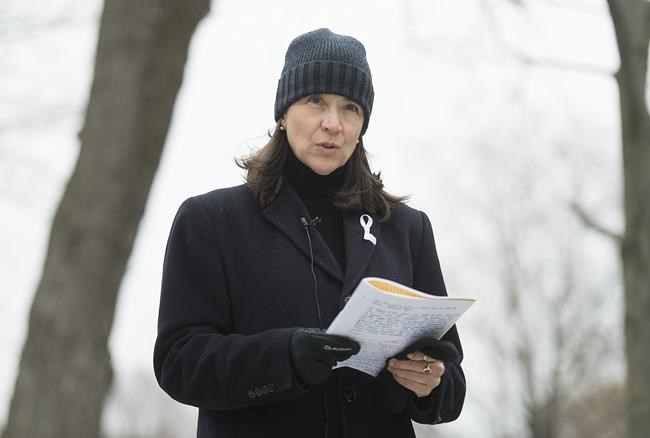MONTREAL — More than 32 years after a gunman motivated by a hatred of feminists opened fire at École polytechnique, killing 14 women and injuring others, Nathalie Provost finally got to attend a convocation.
The gun control advocate and survivor of the 1989 shooting received a standing ovation as she was recognized on Thursday with an honorary doctorate at a ceremony in downtown Montreal.
Provost explained before the ceremony that while she had two previous degrees from the school, traditional graduation ceremonies weren't held back when she was a student, so Thursday's was her first.
Onstage at the ceremony, wearing a cap and gown, she said the tragedy marked her deeply, but also allowed her to learn her own strength and "take the measure of the woman I could become."
She also read the names of the 14 women who died in the tragedy.
In an interview beforehand, Provost said her thoughts would be on how deeply the school has marked her life — not only by the tragedy but also by the lifelong friends she made and the education she received.
"The adult person I've become is an engineer to the core," she said in a phone interview. "Even if I don't work as a classic engineer, I am one."
Provost said she returned to class less than a month after being shot four times by Marc Lépine in the Dec. 6, 1989, massacre that's widely believed to be Canada's worst mass shooting specifically targeting women. She graduated with an engineering degree a few months later, in May 1990, and would go on to earn a master's degree from the same school.
In retrospect, she said has realized that she felt she had something to prove in returning to class so soon.
"I think it was kind of a way to say to the world and to Marc Lépine, 'You won't stop me,'" she said.
"'You tried, but you won't succeed.'"
Provost's honorary doctorate comes at a very different time in her life. Her four children, several of whom were in attendance, are the same age as the young graduates.
At 55, she's had a successful career as a civil servant and has climbed the ranks at her job.
"I'm getting to the age of wisdom, where I can look back at what I’ve lived," she said.
In a statement, Polytechnique said it wanted to honour Provost because of her life of "remarkable achievements, driven by uncommon determination and social values, (and) for the example of audacity that she embodies for the new generation of engineers in Quebec, in Canada and around the world."
Pierre Baptiste, interim director of academic affairs and student experience, said Provost has remained connected to the school and has always encouraged young engineering students, especially women.
He said that today, 30 per cent of the school's engineering students are female — a rise he attributes in part to women like Provost who serve as role models to the next generation.
Provost, who became a gun control advocate after the shooting, said she is feeling encouraged by the federal government's new firearms legislation that includes a national freeze on importing, buying, selling or otherwise transferring handguns.
However, she said she feels there's more to do — on gun control as well as on other issues, including gender discrimination and violence against women.
"Equality between men and women is something we have to keep fighting for," she said.
"It's not a closed case," she said, citing the debate over abortion in the United States as an example.
She said the young female engineers who are graduating will likely face less of an uphill battle professionally than she did, but she said they still face complex challenges. "I don't know if they know how important they are, but they are," she said.
After decades of advocacy, Provost said she hasn't yet felt the need to stop telling her story — as long as she feels it can help lead to better gun legislation and concrete change.
“When I no longer believe in my contribution, I won't be able to speak up anymore and probably I'll shut up," she said. "But for the moment, I think I can bring something."
This report by The Canadian Press was first published June 16, 2022.
Morgan Lowrie, The Canadian Press


